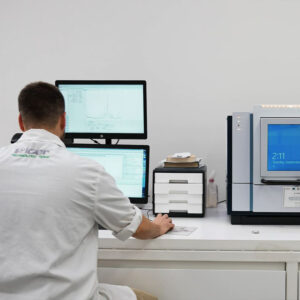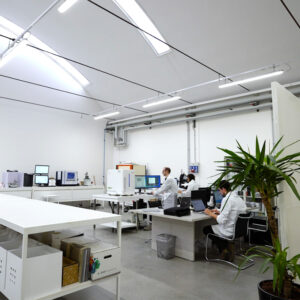The ceramic industry is one of the cornerstone of Italian manufacturing, with a long tradition of excellence and creativity. In recent years, technological innovation has deeply changhed this sector, leading to a significant improvement in production processes and the quality of final products. In this context, Sicer stands out as a leader in the production of raw materials, ceramic mix, inks, glazes and grits for the world’s largest ceramic groups, thanks to its constant commitment to innovation and the search for cutting-edge solutions.
The most important technological innovations of recent decades in the ceramic sector
Over the past decade, the ceramic industry has seen several technological innovations that have radically changed the way ceramic materials are produced and designed. These innovations not only improve production efficiency but also allow for the exploration of new frontiers in product design and functionality. Here are some of the most significant innovations:
- Digital inkjet printing: digital printing has made it possible to achieve previously unthinkable levels of precision and detail, and create easily complex and customized designs. This has led to greater flexibility in production, reduced time to market and opened up new possibilities for architects and designers, who can now explore a wider range of aesthetic and functional options.
- Advanced automation: the integration of robotics and automated systems into production processes has significantly improved efficiency and precision. These systems can handle a variety of tasks, from transporting raw materials to quality control, reducing human error and increasing productivity.
- Advanced materials: the development of new ceramic materials with improved properties is another significant breakthrough. These materials have made it possible to develop ceramic products with improved properties, such as higher strength, durability and superior aesthetic characteristics. Thanks to these materials, it is possible to create ceramic tiles that not only meet aesthetic needs but also functional ones, making them suitable for a wide range of applications.
- Ceramic 3D printing: although still in the development stage, ceramic 3D printing promises to revolutionize the industry, allowing for the creation of complex and personalized shapes with precision. This technology could open up new possibilities in the design and production of ceramic products.
- Sustainability and recycling: the adoption of sustainable practices and recycling technologies has gained momentum in recent years. Ceramic companies are implementing processes to reduce waste, reuse materials and reduce the environmental impact of production.
Ceramic companies and suppliers of raw materials for ceramic companies have been at the forefront of this change, investing in research and development to remain competitive in the global market. Sicer, in particular, has dedicated significant resources to innovation, developing new technologies and constantly improving its products to meet the growing needs of customers.
The impact of Artificial Intelligence (AI)

Artificial intelligence (AI) represents one of the most promising frontiers of innovation in the ceramic sector. AI is used to optimize production processes, reduce waste and improve the accuracy of operations. For example, advanced algorithms can analyze production data in real time to identify anomalies and suggest corrective actions. This allows errors to be minimized and high quality standards to be maintained.
In addition, AI allows new products to be developed through the simulation of processes and materials, accelerating the development cycle and reducing costs. Simulations can predict how a new design or material will behave in real conditions, allowing engineers to make changes and optimizations before physical production. This not only reduces development times but also the costs associated with prototypes and testing.
Companies that are constantly evolving and looking to the future like Sicer cannot ignore the need to know and make the best use of this new and important technology, which is revolutionizing and will continue to revolutionize all work processes within a company.
The use of AI makes it possible to offer customers increasingly immediate and innovative solutions, creating customiized products that better meet specific needs, improving the satisfaction and loyalty of the end customer.
Know-How and service: human value and technology

Despite the advancement of technology, human know-how continues to play a fundamental role in the ceramic sector. The specific skills and experience accumulated over time are irreplaceable elements that contribute to the quality and uniqueness of the products. The combination of advanced technologies and human skills is what allows companies to excel.
The know-how of ceramic artisans and engineers is crucial to understanding the nuances of materials and production processes. Even with automation and AI, human sensitivity and knowledge are essential to make critical decisions and to address the challenges that may arise during production. Human skills allow technologies to be adapted and optimized to the specific needs of the product and the customer.
Sicer: technological innovation and human expertise
Sicer has always been at the forefront of technological innovation in the ceramics sector. The historic supplier of raw material for ceramic companies of Ubersetto constantly invests in research and development to introduce new technologies and improve production processes. This commitment translates into advanced solutions that allow customers to remain competitive in the global market.
However, Sicer’s innovation is not limited to technologies. The company deeply values the know-how and skills of its employees, recognizing that human capital is a key element for success. Sicer promotes a collaborative and creative work environment, where employees are encouraged to share ideas and develop new solutions. This culture of innovation is fundamental to keeping the company at the forefront and offering high-quality products and services.
Sicer offers top-level customer service, providing technical support and customized consulting, thus creating a unique added value for its business partners. Sicer’s team of experts works closely with customers to understand their specific needs and develop tailor-made solutions that optimize production processes and improve the quality of final products. This customer-oriented approach ensures that each project receives the necessary attention and support to succeed.Therefore, the collaboration between technology and human skills will remain key to facing future challenges and seizing global market opportunities. Sicer will continue to invest in both these aspects, ensuring that the company remains a leader in the ceramics sector and a trusted partner for its customers.
Frequently asked questions
Technology, such as AI and automation, improves production processes, but human know-how is crucial for optimisation and creativity, ensuring high quality results.
Digital printing, automation, advanced materials, sustainability, and 3D printing are the main innovations that improve efficiency and design.
AI analyses real-time data, reduces waste and accelerates new product development through simulations.
Human experience and skills are essential to address specific challenges and customise technological solutions.
Waste reduction, recycling and eco-friendly processes improve production efficiency and environmental impact.







